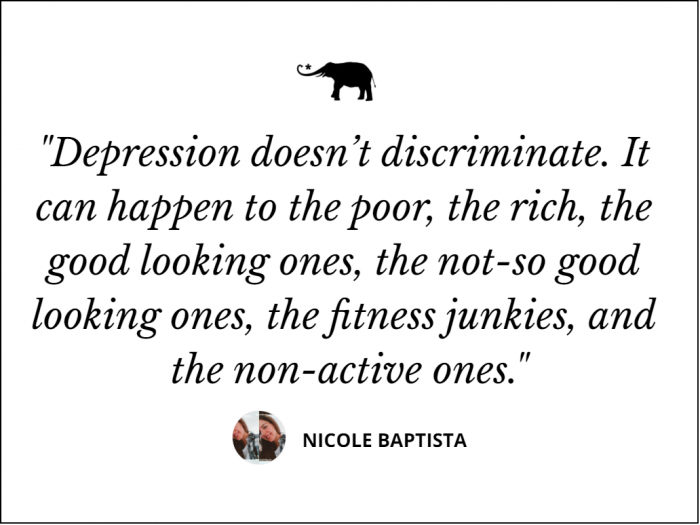“Depression is being colorblind and constantly told how wonderful the world is.” ~ Atticus
~
I think that’s an accurate description. Depression is not a black dog. Depression is a black beast.
We can’t find joy in anything anymore. We feel as though we’re at war with ourselves, our bodies, our minds—especially our thoughts.
We can’t sleep at night because the thoughts don’t stop. We have no appetite for food or for anything. Our brains feel as though they are trapped in a dark cage. And the key has been thrown away.
Depression leaves us hopeless. We can’t see the light at the end of the tunnel.
And the worst part? Depression is a fantastic, sneaky, nasty, and cunning liar. Its ability to make us believe the worst things about ourselves can leave us feeling as though we’re drowning. It is too exhausting to fight.
But lies are lies. They hold no truth. They feel pretty damn real, especially when going through an intense depressive episode. But depression is really just good at deceiving us. It is manipulating like that. That’s why depression is so lethal.
Here is a list of some of the most common lies that depression tells us—because the first key to getting better is to be aware:
1. “You’re not good enough.”
Depression will have us thinking about and rehearsing all our flaws, all the mistakes we have made in the past, all the people who have betrayed us, cheated on us, abused us, all the opportunities we didn’t take, and all the things we “should” be doing but aren’t. It might also tell us we aren’t trying hard enough, no matter how much we achieve or do.
The truth is, we’re all trying our very best in a really difficult and harsh world. Capitalism also plays a part in this—we feel like we must always be on the go, to be “worthy.”
You are good enough. You are doing everything you can at this precise moment. If all you can do at this precise moment is breathe, then breathe.
2. “You should be ashamed of feeling this way.”
Many people with depression get stuck in a shame spiral. People may also ask sufferers, “Why are you depressed? You have nothing to be depressed about.” This of course makes people with depression shut down and feel guilty speaking out about their emotions and thoughts. Shame is a heavy emotion. I wish depression was as openly spoken about as health conditions such as cancer and diabetes, because depression is just as real. It can’t be seen from the outside but it feels like a warzone on the inside.
There is nothing to be ashamed of. Depression doesn’t discriminate. It can happen to the poor, the rich, the good looking ones, the not-so good looking ones, the fitness junkies, and the non-active ones.
If you feel too ashamed to speak to anyone about your feelings, journaling your thoughts can be really useful to clear your mind.
3. “Nobody cares about you.”
Depression isolates. It will convince us that we’re unworthy and that nobody else in the world can understand what we’re going through. The pain is so strong and real that it feels as though we truly are alone in this world.
It’s not true. There is always someone who cares about you. I care about you. You are needed in this world.
4. “Nothing will ever fix you now.”
Depression will convince us that we’re too broken to be fixed, that we are “too far gone,” and that there is no way back. It leaves us hopeless.
The truth is we aren’t too broken, and no matter how awful we feel, there is always a way.
5. “Don’t burden anyone with your problems.”
Depression makes us feel like we’re a burden. This is why so many people struggle to reach out for help. We feel like nobody will care about our issues and that everyone else has their own problems (so ours don’t matter).
Many people who are depressed feel undeserving of love and even happiness. There is so much pressure in this world to look as though everything is going well and to show off all our successes (social media plays a big role here). Many of us also come from families where asking for help is considered to be “shameful” or “weak.” In past generations, mental health issues were not as widely spoken about. It’s time for the cycle to be broken.
You are not a burden. Your problems are as valid as anyone else’s.
6. “You’re weak.”
You always feel as though you’re losing the battle when it comes to depression. It doesn’t matter how hard you try. It leaves you emotionally and physically depleted. It can also cause physical symptoms: fatigue, brain fog, headaches.
It isn’t you. It’s the depression.
7. “You will feel like this forever.”
This is probably the most painful lie of them all. It seems as though there is no way out. It feels like a never-ending battle. Every day feels the same as the day before—mundane, grey, rubbish. Hope is gone.
But depression doesn’t have to be forever. There are always options. You can choose to explore the medication route, but you don’t have to. Reaching out to someone is a good option (although it can feel quite difficult). You can take baby steps each day: a 20-minute yoga practice, 10 minutes of meditation, a stroll in the park, meeting a friend for coffee. Start small.
Many of us have heavy layers of trauma, and in this case, it is often a good idea to work with a licensed trauma therapist.
Some of the beneficial healing modalities that are worth looking into are: EFT tapping, EMDR, somatic experiencing, and hypnosis.
The most important thing to remember is that there is a way out, there is always hope, and that you are never, ever alone.


 Share on bsky
Share on bsky






Read 20 comments and reply